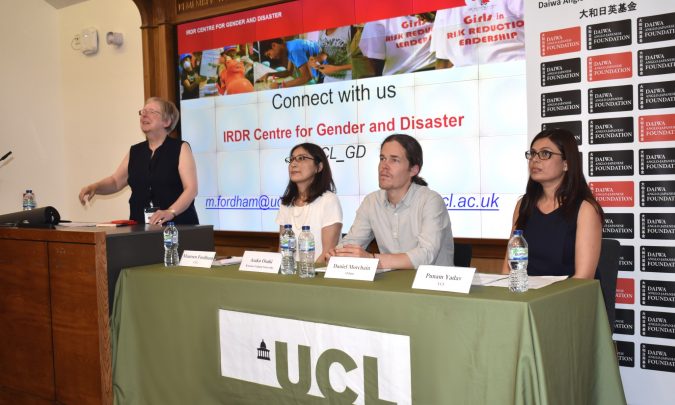 Seminar
SeminarThursday 28 June 2018
6:00pm – 7:45pm
Women’s Economic Empowerment in Post-Disaster Reconstruction: a study of Tohoku
Gustave Tuck Lecture Theatre, University College London, 2nd Floor, South Junction, Wilkins Building, Gower Street WC1E 6BT
大和日英基金 主催
On March 11 2011, a 9.0 magnitude earthquake hit the north-east coast of Japan, causing a massive tsunami. The scale of the damage was unprecedented. One of the key reconstruction activities has been supporting women’s economic empowerment. After disasters, women play a vital role in rehabilitating the household and the community, which is one strategic approach in post-disaster recovery and reconstruction efforts. In this talk, Professor Asako Osaki will talk about good practices of economic empowerment of women in post-disaster reconstruction in Tohoku, Japan. An expert on climate change and economic justice issues from Oxfam will then present a wider perspective of climate adaptation and economic empowerment for vulnerable and marginalised communities and groups living in climate hotspots.
The event is organised in cooperation with the Institute for Risk & Disaster Reduction (IRDR) Centre for Gender and Disaster, UCL, and will be held at the Gustave Tuck Lecture Theatre, University College London.
コントリビューターについて
Asako Osaki
Asako Osaki, Visiting Professor at Kwansei Gakuin University, School of Policy Studies, is a specialist on gender issues. She began her career at the U.N. Development Programme, specialising in the promotion of gender equality and women’s empowerment in developing countries. Since returning to Tokyo, she has been active in mainstreaming gender in Japan’s domestic and development assistance policies and programmes, working with the Government, NGOs and research institutions. Her expertise lies in the integration of gender perspectives into policies and programmes in areas such as entrepreneurship, disaster risk reduction and reconstruction, and peace and security. Osaki has spoken extensively at events both in Japan and abroad, including at the APEC Women and Economy forum 2014, where she presented on the “Economic Empowerment of Women in the Post-Disaster Reconstruction Process”. She also participated in the 2016 W20 (G20 Women’s Forum) as part of the Government of Japan’s official delegation.
Daniel Morchain
Daniel Morchain, who happened to be in Tokyo on March 11, 2011, is Global Adviser, Climate Change Adaptation at OXFAM. He has designed and implemented adaptation and development strategies that aim to support the poorest and marginalised. His focus areas in the context of climate change adaptation and development are: vulnerability analysis, gender, cross-scalar participatory processes and transformation. He has experience of working in over a dozen countries in Africa, Asia, the Middle East and Latin America. He has previously worked at the Stockholm Environment Institute and with ICLEI – Local Governments for Sustainability. He has a Master’s degree in Environment Management and Policy from Lund University, Sweden, and has completed postgraduate courses on resilience and climate change adaptation at the UN University in Japan and at SOAS.
Punam Yadav
Dr Punam Yadav is Research Fellow in Gender and Disaster at the IRDR Centre for Gender and Disaster at UCL. She is interested in examining women’s agency in the context of conflict and disaster. She started her professional career as a development practitioner in Nepal and worked for over ten years with various International and National NGOs before starting her academic career in 2010. She was at the London School of Economics and Political Science (LSE) before joining UCL. She has a number of publications including her recent academic monograph Social Transformation in Post-conflict Nepal: A Gender Perspective, published by Routledge in 2016.
Maureen Fordham
Maureen Fordham (Chair) is Professor of Gender and Disaster Resilience and the first Director of the IRDR Centre for Gender and Disaster at UCL. She has been researching disasters since 1988 and is an expert on community-based disaster risk reduction and vulnerability analysis, focusing on the inclusion of a range of marginalised social groups in disaster risk reduction, especially women and girls. She was a founding member of the Gender and Disaster Network in 1997 and is the Coordinator of its website (www.gdnonline.org) and activities. She has been a governmental advisor at all scales from local through national to the global UN level.